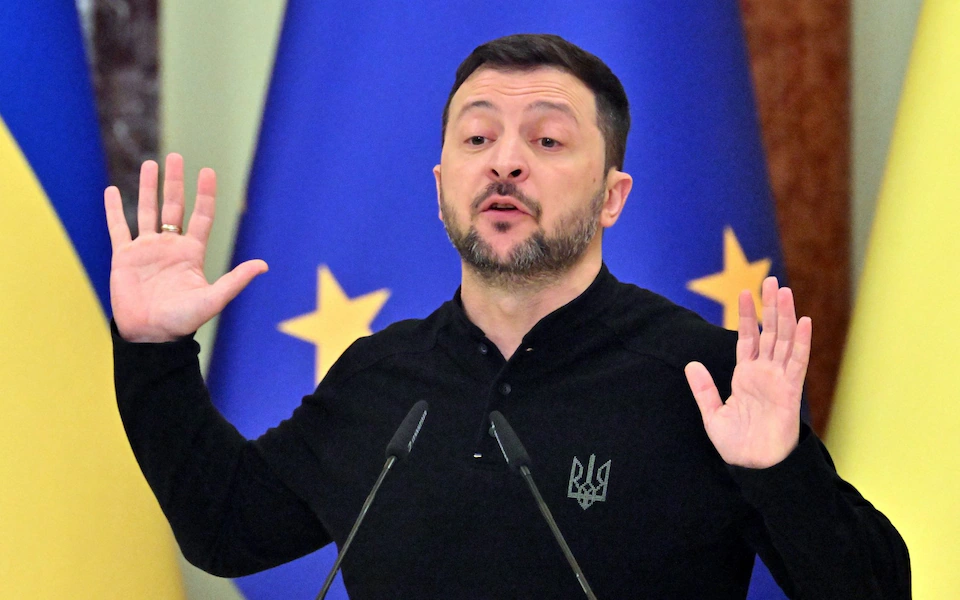
Volodymyr Zelensky said that his country needed security guarantees from Nato and more weapons to defend itself before any talks with Russia.
Ukraine’s president made the comments after meeting Kaja Kallas, the EU’s new head of diplomacy, and Antonio Costa, freshly appointed president of the European Council, who were visiting Kyiv as a show of support on their first day in office.
“An invitation for Ukraine to join Nato is a necessary thing for our survival,” Mr Zelensky said at a press conference with Mr Costa.
It comes after Mr Zelenksy appeared to shift his position dramatically on Friday by accepting that Ukraine may have to give up some territory “temporarily” to end the war. He said the occupied land could be negotiated back in the future “diplomatically”.
Ukraine faces a tough winter ahead, with Russia unleashing devastating barrages against its power grid and Kyiv’s fatigued forces losing ground on the front line.

Questions are also swirling around the future of US support once Donald Trump assumes the presidency in January, with fears he could force Kyiv to make painful concessions in pursuit of a quick peace deal.
Mr Zelensky said his country needed to be in a “strong position” before any talks with the Kremlin, calling for “steps forward with Nato” and a “good number” of long-distance weapons to defend itself.
“Only when we have all these items and we are strong, after that, we have to make the very important… agenda of meeting with one or another of the killers,” the Ukrainian leader said, adding that the EU and Nato should be involved in any negotiations.

Mr Costa said the European Union would give Ukraine its “unwavering” support, telling Mr Zelensky: “We have stood with you since the very first day of this war of aggression, and you can count on us to continue to stand with you.”
The European Union’s new leadership team is keen to show it remains firm on backing Kyiv at a perilous moment for Ukraine nearly three years into its fight against Russia’s invasion.
Vladimir Putin, Russia’s president, threatened this week to strike government buildings in Kyiv with his new Oreshnik missile, after the US gave Ukraine approval to fire long-range Atacms missiles into Russia for the first time.
A Russian drone dropped explosives on a bus in the southern Kherson region on Sunday, killing three people, authorities said, while the Russian army claimed to have captured two new front-line villages in the east.
On Friday Mr Zelensky appeared to begin staking out his position ahead of any potential peace talks.
He called on Nato to offer guaranteed protections to parts of Ukraine controlled by Kyiv in order to “stop the hot stage of the war”, and implied he would then be willing to wait to regain other territory seized by Russia.
“If we will have a frozen conflict without any strong position for Ukraine, Putin will come back in two, three or five years,” Mr Zelensky said on Sunday.
Ms Kallas told journalists on the journey into Ukraine that for Kyiv “the strongest security guarantee is Nato membership”.
“We need to definitely discuss this – if Ukraine decides to draw the line somewhere then how can we secure peace so that Putin doesn’t go any further,” she said.
However, diplomats at Nato said there appeared little prospect of the alliance granting Ukraine membership soon given opposition from a raft of members cautious of getting dragged into war with Russia.
Mr Zelensky insisted Kyiv was not “delusional” about its prospects with Nato and admitted there was deep reluctance from US president Joe Biden, along with leaders in countries such as Hungary.

Ms Kallas said the EU “shouldn’t really rule out anything” in terms of the question of sending European troops to help enforce any ceasefire.
“We should have this strategic ambiguity around this,” she said.
Mr Trump has cast doubt on continuing Washington’s vast aid for Ukraine and called on EU countries to do more.
Europe together has spent around $125 billion (£98 billion) on supporting Ukraine since Russia’s 2022 invasion, while the US alone has coughed up over $90 billion (£71 billion), according to a tracker from the Kiel Institute.
Ms Kallas said the EU would use “transactional language” to try to convince Mr Trump that backing Kyiv was in America’s interest.
“Aid for Ukraine is not charity,” she said. “A victory for Russia definitely emboldens China, Iran, North Korea.”